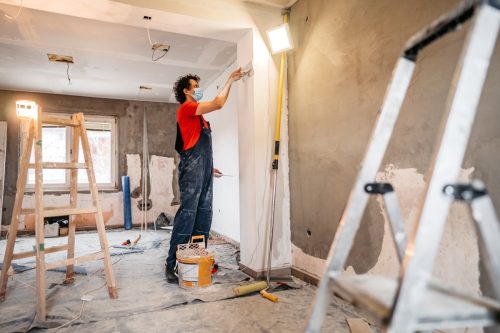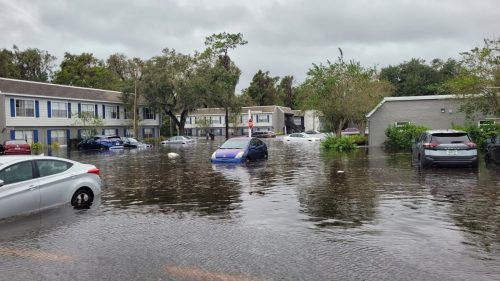FBI Says These Are the Homeowner Scams to Watch Out for Now
Con artists are looking to take advantage of the high costs associated with our homes.

Buying a house is typically the biggest expense people face in their lifetime. From a down payment to the monthly mortgage, there is a lot of money being moved around during the process. And the payments never really stop piling up. You also have to constantly consider the costs associated with things like utility bills, maintenance, and repairs. So the last thing you need is to realize you've been the victim of one of many homeowner scams.
The U.S. Federal Bureau of Investigation (FBI) found that people lost over $10.3 billion to online scammers in 2022 alone. And one of the most cost-effective areas of exploitation for these criminals is the real estate sector. Last year, the FBI issued a warning to homeowners about a recent spike in real estate scams. But what exactly should you be looking out for? Read on to find out more about four major homeowner scams the agency has advised people to watch out for.
READ THIS NEXT: FBI Issues New Warning About the Latest Scams Designed to "Steal Your Money"
1
Real estate wire fraud

Real estate wire fraud falls under the business email compromise (BEC) umbrella, which the FBI says is "one of the most financially damaging online crimes." With this scam, con artists target homeowners who are making large wire transfers for various real estate transactions.
"Often, the criminals pose as parties to the transaction and directly communicate with the other parties to steal funds intended to pay for the real estate," the FBI explained in a 2022 report.
Scammers usually strike when people are looking to make a down payment on a new home. This makes real estate wire fraud a unique type of BEC scam because of just how much damage it can cause, according to the FBI.
"Many times the buyer is using the proceeds from a home sale to fund a new home purchase, or even the buyer's life savings," the agency explained. "The loss of these funds is potentially catastrophic for the victims and their families."
2
Home repair scam

You don't have to be in the process of buying a new home to get hit with troublesome tricks. You could find yourself on the receiving end of someone promising to fix your home under fraudulent pretenses at any point in time. According to the FBI, home repair scams are one of the most common schemes targeting elderly individuals.
"Criminals appear in person and charge homeowners in advance for home improvement services that they never provide," the agency explained.
Cam Dowski, a real estate mogul and founder of WeBuyHousesChicago.Co, tells Best Life that home repair schemes are particularly troublesome because they can "leave homeowners with unsafe living conditions" or costly repairs to fix any damage potentially caused by shoddy work.
"This scam can be easy to fall for because scammers often use high-pressure sales tactics and offer services at a very low price," Dowski explains. "Homeowners should be cautious of anyone who offers to do work without a proper license or insurance, or who asks for payment upfront."
For more on scams delivered straight to your inbox, sign up for our daily newsletter.
3
Disaster relief fraud

Fake home repair promises can also pop up as a scheme for natural disaster fraud. In Jan. 2023, the FBI helped to bring charges against a fraudulent contractor who had been accused of scamming homeowners out of around $2.5 million in disaster relief funds during the aftermath of Hurricane Sandy.
"For nearly four years, this contractor allegedly promised families that he'd repair their homes, but instead he used disaster relief money to buy exotic sports cars and property in another state," Anne T. Donnelly, Nassau County District Attorney, explained in a statement.
But con artists may also attempt to gather donations for fake charities or commit insurance fraud after a natural disaster—which could end up "re-victimizing people whose homes have been damaged," according to the FBI.
Dowski says homeowners often experience financial loss or identity theft as a result. "Scammers often target those affected by disasters because they may be more willing to donate money in a time of need," he explains. "Homeowners should be wary of any unsolicited requests for donations and should research charities and relief organizations before donating. They can also check with the Better Business Bureau's Wise Giving Alliance to ensure that the organization is legitimate."
4
Mortgage modification scams

Maintaining the high costs associated with owning a house is hard for most people, and over time, some may end up at risk of losing their homes because of this. Unfortunately, scammers are more than willing to try and "prey on the desperation of homeowners who are facing foreclosure," according to Dowski.
In 2018, the FBI sent out an alert warning that mortgage fraud increases as real estate prices increase. Loan modification is one of the rising concerns targeting distressed homeowners who may be struggling to keep up with their costly mortgage payments.
"Scammers will offer to modify or refinance their mortgage at a very low rate, but they'll charge upfront fees," Dowski warns. "However, the criminals do not provide any real assistance and may even trick homeowners into signing over the title to their homes."
- Source: https://www.fbi.gov/how-we-can-help-you/safety-resources/scams-and-safety/common-scams-and-crimes/business-email-compromise
- Source: https://www.fbi.gov/file-repository/fy-2022-fbi-congressional-report-business-email-compromise-and-real-estate-wire-fraud-111422.pdf/view
- Source: https://www.fbi.gov/how-we-can-help-you/safety-resources/scams-and-safety/common-scams-and-crimes/elder-fraud
- Source: https://www.justice.gov/usao-edny/pr/long-island-contractor-indicted-multi-million-dollar-fraud-connection-hurricane-sandy
- Source: https://www.fbi.gov/contact-us/field-offices/denver/news/press-releases/community-advisory-protect-yourself-from-mortgage-fraud





















